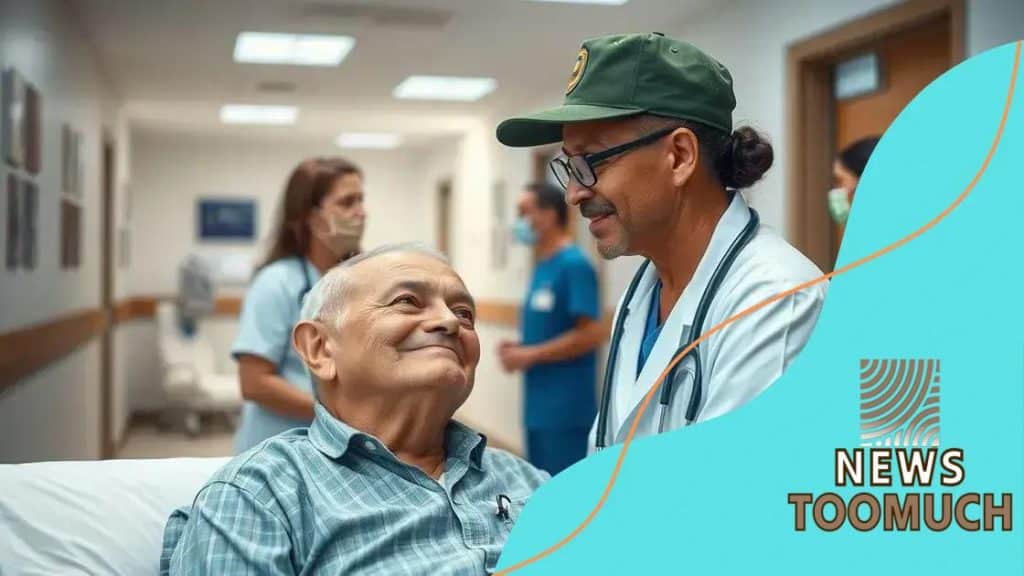Federal support for veterans’ health services in 2025

Federal support for veterans’ health services in 2025 enhances accessibility to healthcare, expands mental health initiatives, and creates opportunities through technology and community partnerships, ensuring better overall care for veterans.
Federal support for veterans’ health services in 2025 represents a crucial step in enhancing the healthcare landscape for those who served. Are we doing enough to meet their needs? Let’s dive into the changes ahead.
Overview of federal support programs
The federal support programs for veterans have evolved significantly over the years. In 2025, these programs will play a pivotal role in ensuring that our veterans receive the care they deserve. They provide not just healthcare, but a comprehensive range of services that address various needs.
Types of Federal Support Programs
These programs can be categorized into several key areas:
- Healthcare Services: This includes access to hospitals and specialty clinics.
- Financial Support: Programs offering disability compensation and benefits.
- Mental Health Services: Focused initiatives to support mental well-being and PTSD treatment.
- Vocational Training: Resources and funding for education and job training.
As these initiatives expand, the focus on accessibility becomes paramount. With more funding anticipated, veterans will find it easier to access necessary services. For example, many programs now offer telehealth options, which help to connect veterans with healthcare providers from the comfort of their homes. This shift has greatly improved convenience and access to care.
Impact on Veterans
Veterans have reported that these support systems significantly improve their quality of life. A crucial aspect is the integration of mental health support within the healthcare framework. This holistic approach ensures that veterans are treated not only for physical injuries but also for emotional and psychological challenges.
Moreover, feedback from veterans is being considered more than ever in shaping these programs. This inclusive approach allows the government to tailor services that align closely with the needs of those who served. Ongoing surveys and initiatives focus on gathering opinions from veterans to enhance the effectiveness of each program.
In summary, understanding the federal support programs available is essential for veterans navigating their healthcare options. With continued improvements and greater funding in place, the landscape of veterans’ health services is set to transform significantly in the upcoming years.
Key improvements in veterans’ health services
In recent years, there have been significant key improvements in veterans’ health services. These enhancements aim to provide better care for those who have served in the military. With the federal commitment to increase funding and awareness, the quality of service delivery has seen promising shifts.
Technological Advancements
One major area of improvement is the incorporation of technology into healthcare services. Veterans now have access to:
- Telehealth Services: Virtual visits with healthcare providers make it easier for veterans to receive care without commuting long distances.
- Medical Apps: These apps help veterans manage their health, reminding them of appointments and medications.
- Health Record Access: Improved systems allow veterans to access their health records online, enhancing engagement in their own care.
These technological innovations have made healthcare more accessible and efficient, reflecting a broader trend towards patient-centered care.
Expanded Mental Health Services
Another essential improvement has been the focus on expanding mental health services. The recognition of mental health as a critical component of overall health has led to:
- Increased Funding: More resources are directed towards mental health programs specifically tailored for veterans.
- Support Groups: Peer-led groups provide crucial support networks.
- Access to Specialists: Easier access to psychologists and counselors trained in veteran-specific issues is now a priority.
This emphasis on mental health ensures that veterans receive comprehensive care that addresses both their physical and emotional needs.
Veterans are also reporting a greater variety of treatment options, which helps them choose what works best for their situations. The improved approach to care includes holistic practices such as yoga and mindfulness programs, recognizing the importance of mental well-being.
Furthermore, community-based services are expanding, providing veterans with more immediate access to care in their local areas. These services enhance outreach efforts, ensuring that veterans are aware of their options and can seek help when needed. As funding continues to increase, we can expect to see more innovations and improvements ahead.
Impact of funding on mental health initiatives

The impact of funding on mental health initiatives for veterans has been profound and far-reaching. With increasing financial resources, programs designed to assist veterans’ mental health are becoming more effective and widespread. This additional funding is not just beneficial but essential for addressing the unique challenges that veterans face.
Enhanced Access to Resources
One major advantage of increased funding is the enhanced access to mental health resources. Veterans can now benefit from:
- More Treatment Facilities: New centers are opening across the country, making help more accessible.
- Increased Staffing: More trained professionals are available to meet the needs of veterans.
- Innovative Programs: Enhanced funding allows for the development of cutting-edge treatments such as art and music therapy.
This expanded access is vital, as many veterans struggle to obtain timely assistance when they need it most. With these improvements, veterans can receive appropriate care tailored to their needs.
Community Outreach and Support
Another significant impact of funding is the increased focus on community outreach. Programs are now better positioned to reach veterans where they are. For instance, many initiatives involve:
- Partnerships with Local Organizations: Collaborations with community groups help spread awareness about available services.
- Mobile Outreach Teams: These teams go into underserved areas to provide immediate support and resources.
- Peer Support Programs: Veterans are coming together to share experiences and support each other, which fosters a sense of belonging.
This community-based approach not only increases awareness but also creates a supportive network for veterans, which is crucial for their mental well-being.
Funding also plays a crucial role in research aimed at understanding the mental health challenges faced by veterans. With more resources devoted to research, we can gain insights that lead to better programs and supports. The goal is to create an environment where veterans feel safe seeking help and are confident in the care they receive.
Success stories from veterans receiving care
Success stories from veterans receiving care highlight the positive impact of federal support programs. These narratives inspire hope and showcase the tangible benefits of accessing health services. Many veterans have experienced remarkable improvements in their lives, thanks to the resources now available to them.
Transformative Experiences
Veterans often share how receiving proper care has changed their lives. Some common themes in these stories include:
- Improved Physical Health: Many veterans report better management of chronic conditions and injuries, leading to a more active lifestyle.
- Enhanced Mental Wellness: Access to mental health services has helped veterans overcome challenges like PTSD and depression.
- Stronger Community Connections: Support groups and community programs have fostered friendships and built networks of support.
These experience show the importance of comprehensive care that addresses both physical and mental health. The stories often reveal how veterans have regained a sense of purpose and fulfillment.
Real-Life Impact
Take the story of John, a veteran who faced severe depression after returning from deployment. Through a combination of therapy and support programs, he rediscovered his passion for painting. John now leads art therapy sessions for fellow veterans, helping them express their experiences through art.
Similarly, Sarah, a veteran injured in combat, has benefited greatly from physical rehabilitation programs. With dedicated therapists and modern equipment, she has regained mobility and returned to activities such as hiking and cycling. These successes show the critical role that tailored health services play in recovery.
Another success story is that of a veteran-led initiative to create peer support networks. Veterans help one another navigate the available services, share experiences, and provide encouragement. This grassroots approach fosters a sense of belonging and helps many veterans feel less isolated in their journeys.
These narratives exemplify the powerful outcomes of the federal health programs available. As funding continues to support these efforts, more veterans will have the chance to share their success stories and inspire others.
Future challenges and opportunities
The future challenges and opportunities for veterans’ health services are complex and require careful consideration. As we look ahead, it’s clear that while there are many advancements, obstacles still remain that need to be addressed in order to ensure effective care for veterans.
Challenges Ahead
One significant challenge is the need for continuous funding. Although current investments have made a difference, the demand for health services is growing. This leads to:
- Increased Demand for Services: More veterans are seeking help, particularly for mental health issues.
- Resource Allocation: Ensuring that funds are allocated efficiently to areas of greatest need.
- Staffing Shortages: Finding qualified professionals to meet the demands of expanding programs.
These challenges can strain existing systems and require innovative solutions to meet the needs of our veterans.
Opportunities for Improvement
Despite these obstacles, there are numerous opportunities to enhance veterans’ health services. Advancements in technology present exciting possibilities. For example, telehealth can improve access to care, especially for veterans in remote areas. The future also holds potential for:
- Enhanced Training Programs: Investing in ongoing training for healthcare providers to specialize in veteran care.
- Community Partnerships: Collaborating with local organizations to provide comprehensive support services.
- Research and Development: Focusing on innovative treatments and therapies tailored for veterans.
By actively pursuing these opportunities, we can create a more robust system to support veterans and their families. This proactive approach will help meet their unique needs and improve outcomes.
In summary, addressing the future challenges and seizing the opportunities requires collaboration between government agencies, healthcare providers, and the communities they serve. By working together, we can ensure that veterans receive top-quality care and support long into the future.
In conclusion, the evolution of federal support for veterans’ health services illustrates significant progress in addressing the needs of those who have served our country. While challenges remain, such as funding and accessibility, there are numerous opportunities to create a more effective support system. By embracing technology, expanding mental health initiatives, and building community partnerships, we can foster a better future for veterans. Their success stories inspire hope and remind us that with continued investment and collaboration, we can truly make a difference in their lives.
FAQ – Frequently Asked Questions about Federal Support for Veterans’ Health Services
What are the main benefits of federal support programs for veterans?
Federal support programs provide veterans with access to healthcare services, mental health resources, and financial assistance, improving their overall well-being.
How does telehealth improve access for veterans?
Telehealth allows veterans to connect with healthcare providers remotely, reducing the need for travel and increasing the convenience of receiving care.
Why is mental health support important for veterans?
Mental health support is crucial as many veterans face challenges like PTSD and depression, and addressing these issues is vital for their recovery and quality of life.
How can community partnerships enhance veterans’ healthcare services?
Community partnerships help extend resources and support, enabling veterans to access a broader range of services tailored to their specific needs.





